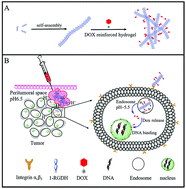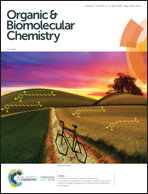Doxorubicin-reinforced supramolecular hydrogels of RGD-derived peptide conjugates for pH-responsive drug delivery†
Abstract
Drug incorporation in hydrogels often brings undesirable effects on the stability or mechanical properties of the system. To address this problem, we report the design and synthesis of a RGD-derived peptide conjugate (1-RGDH) for its co-assembly with a commonly used chemotherapeutic drug, doxorubicin (DOX), that formed electrostatic interactions with the 1-RGDH peptide and reinforced the supramolecular network of nanofibers within the matrix of the hydrogel. The hybrid hydrogel demonstrated excellent viscoelastic and shear-thinning properties that greatly facilitated the development of injectable drug delivery systems. Furthermore, it demonstrated a unique pH responsive release of DOX under weakly acidic conditions, paving ways for the controlled release of drug cargos in a typical tumor microenvironment with mild acidity. Finally, the DOX-incorporated hydrogel exhibited a superior anti-tumor efficacy in non-small-cell lung cancer cells A549 compared to the aqueous solution of free DOX, with an integrin receptor-mediated endocytosis pathway revealed for the cellular uptake of DOX-incorporated nanofibers.

- This article is part of the themed collection: Supramolecular chemistry in OBC


 Please wait while we load your content...
Please wait while we load your content...